WHY ARE THERE TWO YEARS OF KINDERGARTEN?
The first years of life see children’s brains undergo tremendous growth. Neuroscience shows that early brain development is critical in shaping the learning, development, health and wellbeing of children, and impacts on their future life opportunities.
Social science shows that quality early childhood education improves children’s outcomes before, during and after the school years, and that two years of kindergarten have a greater impact than one.
International studies suggest 15 hours per week is the optimal number of hours in an early childhood education program in order to have a positive impact on children’s learning and development. (Reference – State of Victoria – Department of Education and Training, 2020)
WHEN DO WE ENROL?
“Families of children with birth dates between 1 January and 30 April have a choice about whether their child will commence school in the year they turn five or the following year, and therefore whether they commence kindergarten in the year they turn four or the year they turn five. Families with children born between 1 January and 30 April need to make an informed choice about which year they would like their child to commence school and therefore which year their child will attend a funded kindergarten program. Families who have questions about the best time for their child to commence school, and hence kindergarten, should discuss this decision with an early childhood teacher, Maternal and Child Health Nurse, Prep teacher or other professions involved in supporting the development of their child.”
Source – DEECD Kindergarten Funding Guide 2014
HOW DOES FREE KINDER WORK?
Kinder in sessional (standalone) kindergarten services will be supported to provide a free, 15 hour kindergarten program through an additional per child payment of $2,500.
3YO Kindergarten programs that are less than 15 hours per week will be paid the Free Kinder subsidy pro-rata.
Children who attend a sessional kindergarten program (that does not attract the Commonwealth Child Care Subsidy) in a long day care service will attract the sessional rate of $2,500 and be able to participate at no cost.
For more information on the Free Kinder Initiative, please click on the link
Quick guide for parents | vic.gov.au (www.vic.gov.au)
IS A SECOND YEAR OF 3-4YO FUNDED KINDERGARTEN AVAILABLE?
All children in 3-4YO kindergarten will be expected to transition to the Pre-Prep program in the following year. A funded second year of kindergarten will only be available for children in the Pre-Prep program who meet specific criteria outlined below (click here for more information)
IS A SECOND YEAR OF FUNDED PRE-PREP PROGRAM AVAILABLE?
Currently, children in the Pre-Prep program who have developmental delays in two or more key areas of development and who would benefit from a second year of kindergarten will be eligible to access a second year of funded Pre-Prep following an assessment by an early childhood teacher.
IS IMMUNISATION A REQUIREMENT FOR ENROLMENT?
The Victorian Government has amended the Public Health and Wellbeing Act 2008. To have an enrolment confirmed, parents/carers must provide the service with:
- a current Immunisation History Statement from the Australian Immunisation Register (AIR); AND
- the statement must show that the child is up to date with all vaccinations that are due for their age; or that they are able to receive. An Immunisation History Statement from the AIR is the only type of immunisation record that early childhood services can accept for the purposes of confirming enrolment.
WHAT ARE THE PRIORITY OF ACCESS GUIDELINES?
The Priority of Access (PoA) criteria require funded kindergarten services to prioritise specified cohorts of children, in the instance there is a higher demand than places available. This helps to ensure that children who are vulnerable, disadvantaged or who have a disability are supported to access a kindergarten place.
Children who enrol under these Priority of Access guidelines include:
- Children at risk of abuse or neglect, including children in Out-of-Home Care
- Early Start Kindergarten (known to Child Protection or Child First) or Access to Early Learning
- Aboriginal or Torres Strait Islander Children
- Asylum Seeker and Refugee Children
- Children eligible for the Kindergarten Fee Subsidy
- Children with additional needs, defined as children who:
- require additional assistance in order to fully participate in the kindergarten program
- require a combination of services which are individually planned
- have an identified specific disability or developmental delay
- Multiple birth (triplets or more) – In the event of a multiple birth, please complete a separate application for each child. Only one application fee is required (see below).
Once all PoA children have been accommodated, service-specific criteria can be applied to prioritise children such as those enrolled from a previous year, those with a sibling in the service and/or those living closest to the service.
If your child has additional needs whom may require extra support from kindergarten staff, please indicate this in the space provided on the Enrolment Application Form. Please attach supporting documentation from qualified professionals if you are enrolling under the Priority of Access Guidelines. Supporting documentation includes a referral from the National Disability Insurance Scheme, an Early Childhood Intervention Service, Preschool Field Officer or Maternal and Child Health Nurse.
Parents with concerns about their child’s needs may wish to obtain extra information from the local kindergarten teacher or the regional Children’s Services Adviser.
WHAT IS THE 2026 KINDER TIMETABLE?
3-4YO Program
Our 3-4YO kinder program offers a total of 15 hours split into three sessions – 6-hour session Tuesdays, 3-hour session on Thursday afternoons and 6-hour session on Fridays. Student numbers are capped at 24 with one Early Childhood Teacher and one Diploma Qualified Educator.
Pre-Prep Program
Our Pre-Prep program also offers a total of 15 hours split across three sessions – 6-hour sessions on both a Monday and Wednesday and a 3-hour session on a Thursday morning. Student numbers are capped at 27, with one Early Childhood Teacher and two Diploma Qualified Educators supporting student learning.

